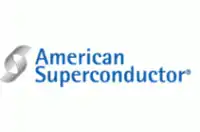American Superconductor
American Superconductor (AMSC) is an American energy technologies company based in Ayer, Massachusetts specializing in the design and manufacture of power systems and superconducting wire.[3] It owns AMSC Windtech in Klagenfurt, Austria.
 | |
| Type | Public |
|---|---|
| NASDAQ: AMSC Russell Microcap Index component | |
| Industry | Electric power infrastructure |
| Founded | 1987[1] |
| Headquarters | , |
Key people | Daniel P. McGahn, President & CEO |
| Revenue | $316 million (2010)[2] |
| $16 million (2010) | |
| Total assets | $400 million (2010) |
| Website | www.amsc.com |
Detroit Edison Project
American Superconductor installed a test of a superconducting electric power transmission power cable in the Detroit Edison Frisbee substation in 2001.[4][5][6]
Holbrook Superconductor Project
The world's first production superconducting transmission power cable, the Holbrook Superconductor Project, was commissioned in late June 2008. The suburban Long Island electrical substation is fed by about 600 meters of superconductor wire manufactured by American Superconductor, installed underground and chilled to superconducting temperatures with liquid nitrogen.[7]
Tres Amigas Project
American Superconductor was chosen as a supplier for the Tres Amigas Project, the United States' first renewable energy market hub.[8] The Tres Amigas renewable energy market hub will be a multi-mile, triangular electricity pathway of Superconductor Electricity Pipelines capable of transferring and balancing many gigawatts of power between three U.S. power grids (the Eastern Interconnection, the Western Interconnection and the Texas Interconnection). Unlike traditional powerlines, it will transfer power as DC instead of AC current. It will be located in Clovis, New Mexico.
2009 government stimulus
In 2009, the Department of Energy announced that they would provide $4.8M to AMSC for further development of superconducting electrical cables.[3]
Sinovel Controversy
In early 2011, a Serbian employee of American Superconductor sold the company's proprietary wind turbine control software to the company's largest customer, China based Sinovel. Sinovel promptly ended its payments to American Superconductor, causing the company to lose 84% of its market cap. The employee was bribed for only $20,500, and later plead guilty to bribery charges.[9]
Korea's LS Cable
AMSC will sell three million meters of wire to allow LS Cable to build 10–15 miles of superconducting cabling for the grid. This represents an order of magnitude increase over the size of the current largest installation, at Long Island Power. [10]
HTS rotors
AMSC has demonstrated a 36.5 MW (49,000 horsepower) High-temperature superconductor (HTS) electric motor for the United States Navy, and is developing a similar 10 MW wind turbine generator through its wholly owned Austria-based subsidiary AMSC Windtec. This would be one of the most powerful turbines in the World. It operates at 30–40 kelvins, and the cooling system uses 40 kW.
References
- "AMERICAN SUPERCONDUCTOR CORP". Archived from the original on 3 October 2011. Retrieved 9 September 2011.
- FE 2009 ANNUAL REPORT
- Berst, Jesse (16 July 2009). "American Superconductor Poised for Super Results". Smart Grid News. Archived from the original on 2 February 2013. Retrieved 22 July 2009.
- "Archived copy". Archived from the original on 14 March 2012. Retrieved 15 October 2018.CS1 maint: archived copy as title (link)
- Gelsi, Steve (10 July 2008). "Power firms grasp new tech for aging grid". Market Watch. Retrieved 11 July 2008.
- "Superconductor Electricity Pipelines to be Adopted for America's First Renewable Energy Market Hub". 13 October 2009. Retrieved 25 October 2009.
- Lappin, Joan. "American Superconductor Destroyed for a Tiny Bribe". Forbes. Retrieved 20 July 2019.
- "American Superconductor Sells Millions of Meters of Wire to Power South Korea". 7 October 2010. Retrieved 23 April 2011.